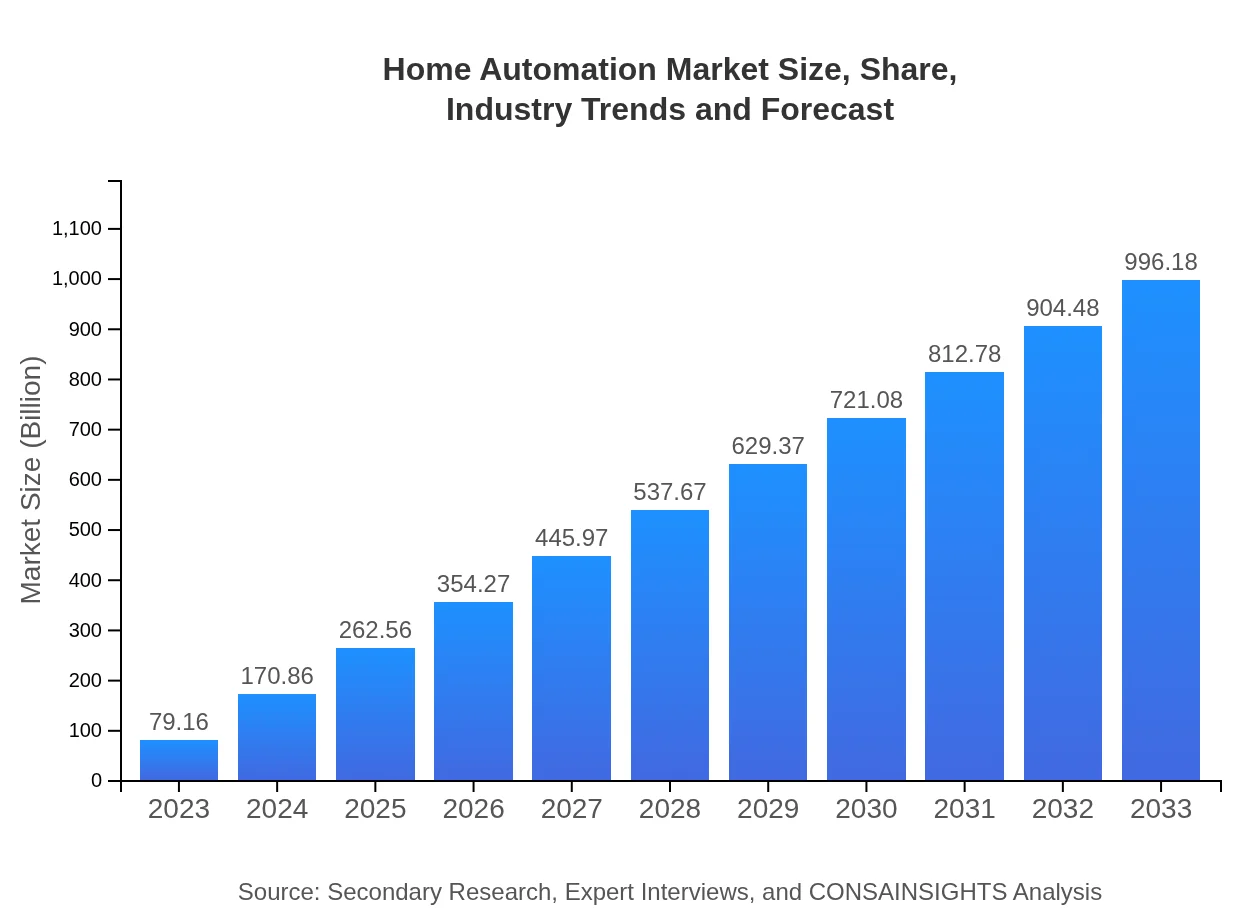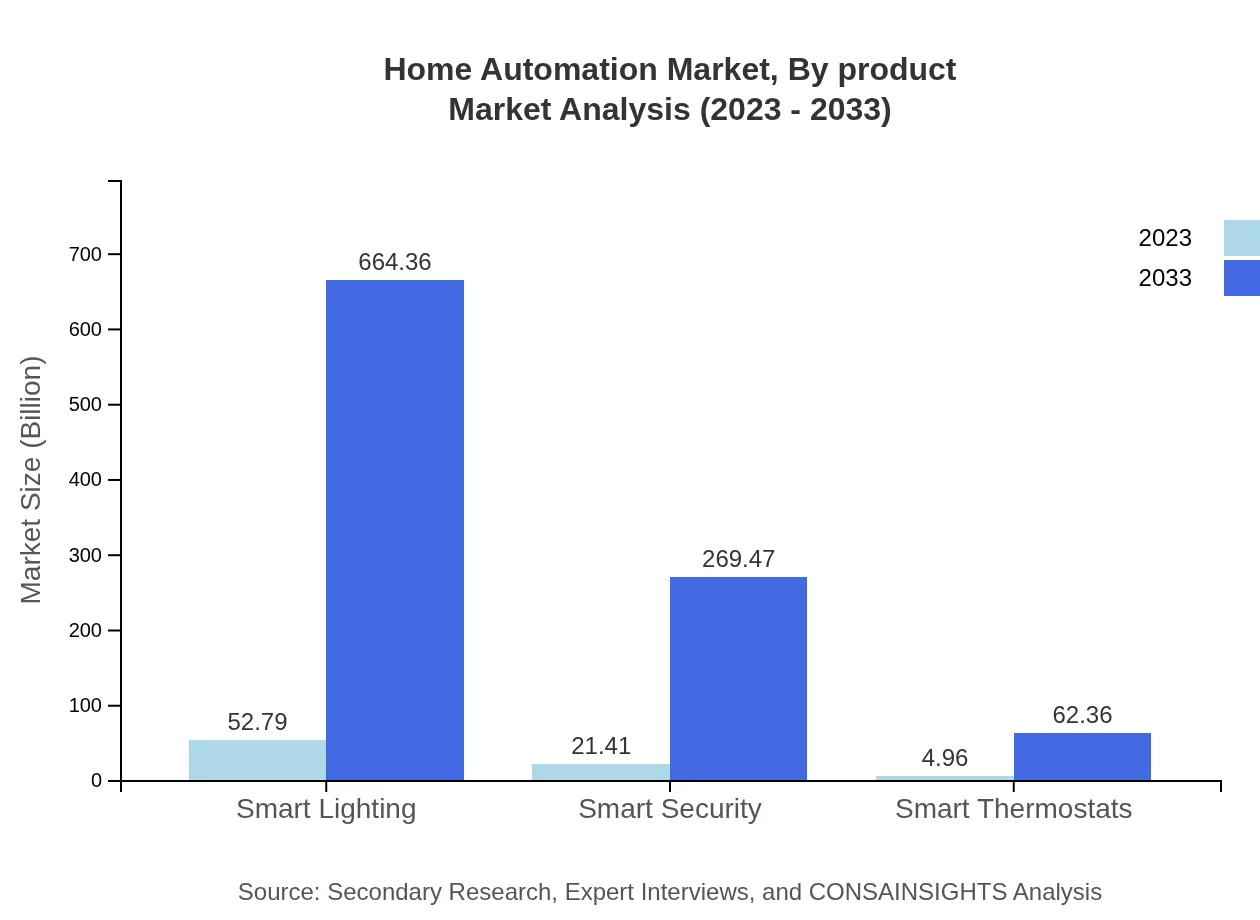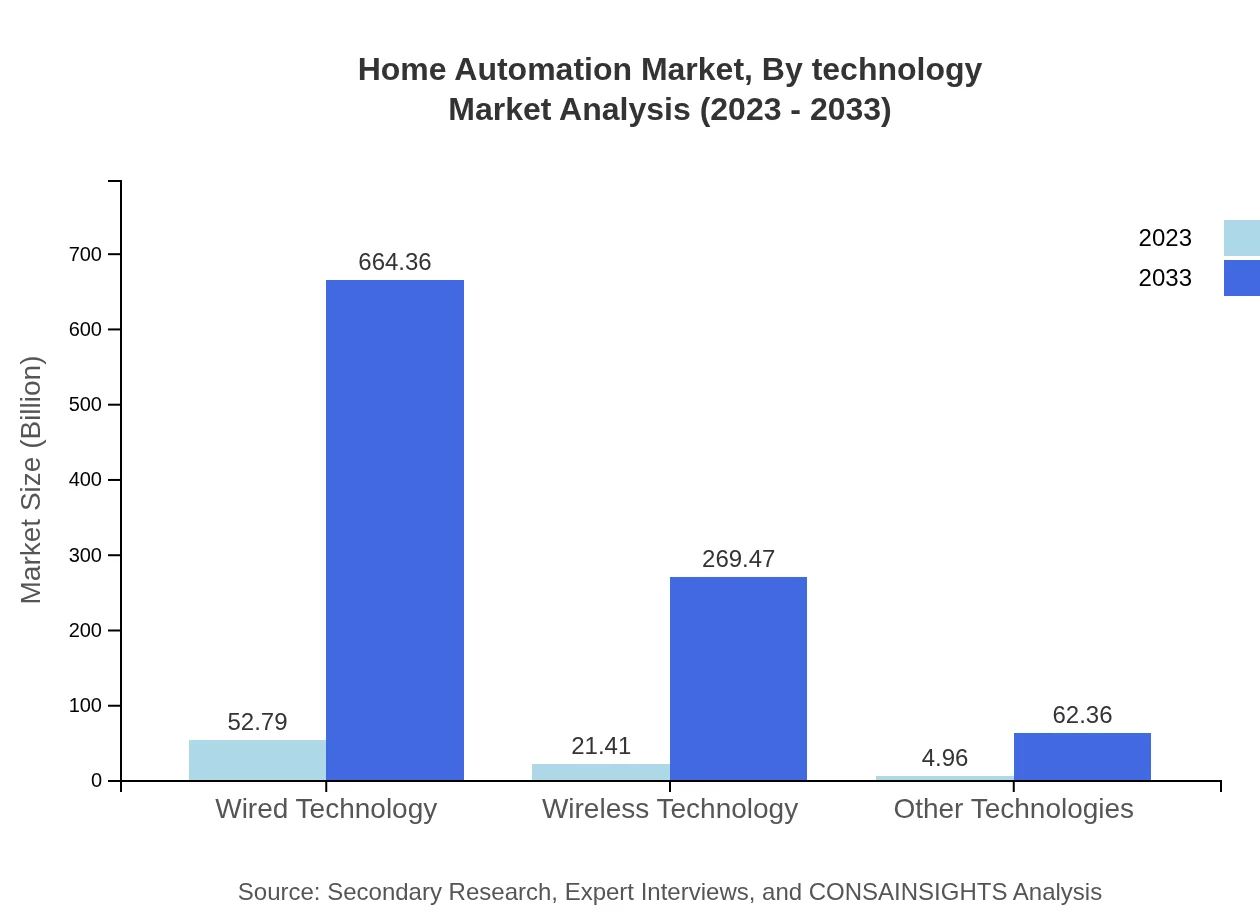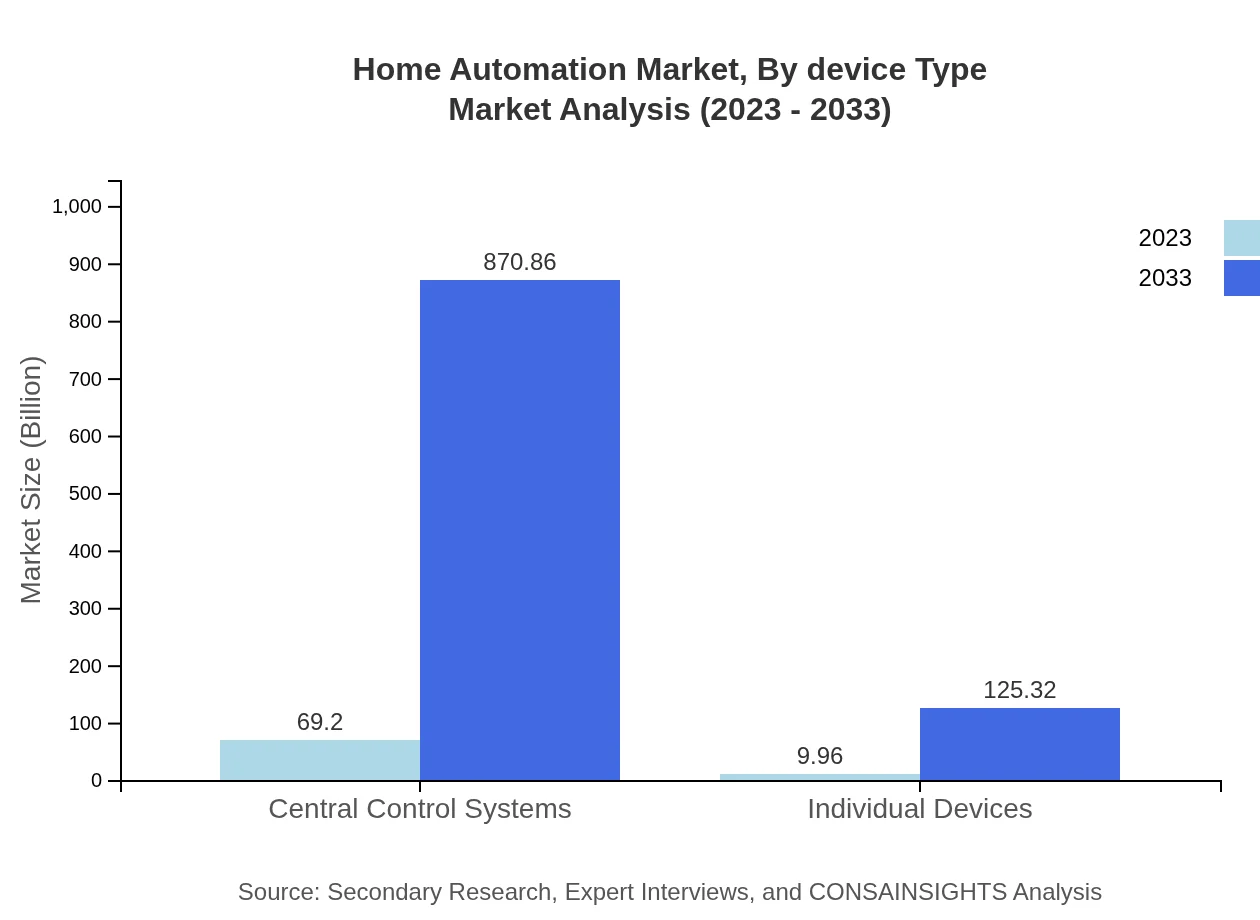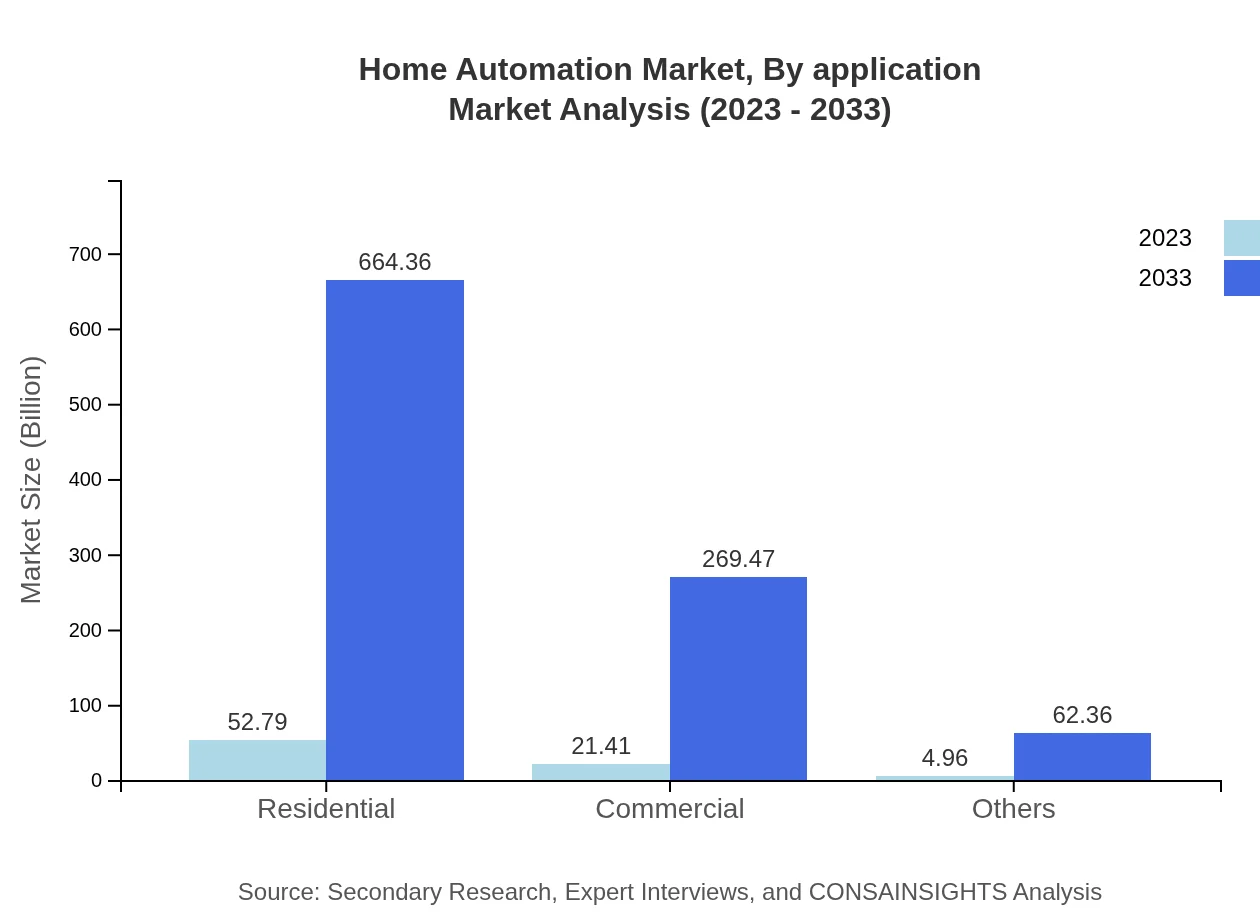Home Automation Market Report
Published Date: 22 January 2026 | Report Code: home-automation
Home Automation Market Size, Share, Industry Trends and Forecast to 2033
This market report provides comprehensive insights into the Home Automation industry, covering market size, growth projections, segmentation, and technological advancements. The analysis includes data-driven forecasts for the years 2023 to 2033.
| Metric | Value |
|---|---|
| Study Period | 2023 - 2033 |
| 2023 Market Size | $79.16 Billion |
| CAGR (2023-2033) | 26.9% |
| 2033 Market Size | $996.18 Billion |
| Top Companies | Google Nest, Amazon , Apple , Samsung SmartThings, Philips Hue |
| Last Modified Date | 22 January 2026 |
Home Automation Market Overview
Customize Home Automation Market Report market research report
- ✔ Get in-depth analysis of Home Automation market size, growth, and forecasts.
- ✔ Understand Home Automation's regional dynamics and industry-specific trends.
- ✔ Identify potential applications, end-user demand, and growth segments in Home Automation
What is the Market Size & CAGR of Home Automation market in 2023?
Home Automation Industry Analysis
Home Automation Market Segmentation and Scope
Tell us your focus area and get a customized research report.
Home Automation Market Analysis Report by Region
Europe Home Automation Market Report:
Europe's market stands at $24.78 billion in 2023, with projections reaching $311.81 billion by 2033. Growing government initiatives towards energy-efficient solutions and a high rate of technology adoption among consumers are significant growth factors.Asia Pacific Home Automation Market Report:
In Asia Pacific, the market size was valued at approximately $14.08 billion in 2023 and is expected to reach $177.22 billion by 2033. Rapid urbanization, increasing disposable incomes, and a growing middle class are propelling demand for smart homes and automation solutions across countries like China and India.North America Home Automation Market Report:
North America leads the market with a valuation of $30.54 billion in 2023, projected to grow to $384.33 billion by 2033. The strong presence of key players, along with high consumer awareness and adoption rates, boosts market growth. The U.S. remains a focal point due to technological advancements and a robust economy.South America Home Automation Market Report:
The South American market is estimated at $1.57 billion in 2023, growing to $19.72 billion by 2033. This growth is driven by increasing residential construction and a rising interest in energy-efficient technologies, particularly in urban areas.Middle East & Africa Home Automation Market Report:
In the Middle East and Africa, the market is valued at $8.19 billion in 2023, expanding to $103.11 billion by 2033. Increased infrastructural investments in smart cities and heightened interest in property security are driving this growth.Tell us your focus area and get a customized research report.
Home Automation Market Analysis By Product
Smart lighting currently leads the market with a size of $52.79 billion in 2023, projected to soar to $664.36 billion by 2033. Similarly, smart security measures reflect strong growth, moving from $21.41 billion in 2023 to $269.47 billion over the next decade. HVAC control systems and other smart devices are also proving increasingly significant as consumer focus shifts towards comprehensive home automation solutions.
Home Automation Market Analysis By Technology
Increasing adoption of wired technology ($52.79 billion in 2023, $664.36 billion by 2033) remains prevalent, but wireless technology, valued at $21.41 billion currently, is growing significantly due to consumer preference for flexible, mobile solutions. These segments reflect a shift toward integrated systems combining various technologies to enhance ease of use.
Home Automation Market Analysis By Device Type
The market split between central control systems and individual devices shows a strong preference for central solutions valued at $69.20 billion in 2023, growing to $870.86 billion by 2033. Individual devices hold a market size of $9.96 billion currently, reflecting consumer interest in piecemeal automation as part of broader systems.
Home Automation Market Analysis By Application
Residential applications dominate the Home Automation market, anticipated to grow from $52.79 billion in 2023 to $664.36 billion by 2033. In contrast, commercial applications, valued at $21.41 billion, are also receiving attention as businesses recognize the value in automation for efficiency and security.
Home Automation Market Trends and Future Forecast
Tell us your focus area and get a customized research report.
Global Market Leaders and Top Companies in Home Automation Industry
Google Nest:
Google Nest designs products for the smart home, focusing on devices that enhance household efficiency, such as smart thermostats and security cameras.Amazon :
Amazon's ecosystem, primarily through Alexa-enabled devices, leads the market in smart home products and services, contributing considerably to user integration and automation.Apple :
Apple integrates its HomeKit platform with its ecosystem, focusing on seamless connectivity among devices and ensuring high security and user experience.Samsung SmartThings:
Samsung offers a range of products under its SmartThings brand, which focuses on home automation and interconnectivity between devices.Philips Hue:
Philips Hue is one of the leading brands in smart lighting, providing a variety of interconnected lighting solutions that enhance home automation and energy efficiency.We're grateful to work with incredible clients.









FAQs
What is the market size of home Automation?
The home automation market is projected to reach approximately $79.16 billion by 2033, growing at a robust CAGR of 26.9%. This growth is indicative of the increasing adoption of smart home technologies and enhanced consumer awareness.
What are the key market players or companies in this home Automation industry?
Key players in the home automation industry include industry giants such as Amazon, Google, and Apple, alongside specialized companies like Philips, Schneider Electric, and Honeywell, all contributing innovative solutions to enhance smart living.
What are the primary factors driving the growth in the home Automation industry?
Factors driving growth include rising consumer demand for smart home devices, technological advancements in IoT, increased awareness of energy efficiency, and the need for improved security features, promoting the integration of automation solutions.
Which region is the fastest Growing in the home Automation market?
North America is the fastest-growing region, expected to expand from $30.54 billion in 2023 to $384.33 billion by 2033. This growth is fueled by high disposable incomes and a strong inclination towards advanced home technologies.
Does ConsaInsights provide customized market report data for the home Automation industry?
Yes, ConsaInsights offers customized market report data, allowing clients to obtain tailored insights that cater to specific needs and preferences within the home-automation industry, facilitating informed decision-making.
What deliverables can I expect from this home Automation market research project?
Deliverables include comprehensive market analysis reports, segmentation data, competitive landscape overviews, consumer trends analysis, and forecasts ensuring a thorough understanding of the market dynamics within home automation.
What are the market trends of home Automation?
Key trends include the rise of smart lighting solutions, advanced security systems, and the integration of AI in home automation. The market is moving towards seamless connectivity and energy-efficient smart home technologies.

